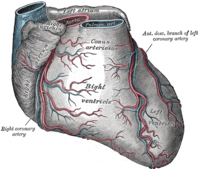
Photo from wikipedia
Anomalous right coronary artery from pulmonary artery (ARCAPA) is a rare congenital heart disease that can lead to abnormal coronary perfusion and a need for surgical repair. Here, we report… Click to show full abstract
Anomalous right coronary artery from pulmonary artery (ARCAPA) is a rare congenital heart disease that can lead to abnormal coronary perfusion and a need for surgical repair. Here, we report the outcomes of patients who underwent ARCAPA surgery within the Pediatric Cardiac Care Consortium (PCCC), a North American registry of interventions for paediatric heart diseases. We queried the PCCC for patients undergoing surgical repair for ARCAPA at <18 years of age between 1982 and 2003. Outcomes were obtained from the PCCC and after linkage with the National Death Index (NDI) and the Organ Procurement and Transplantation Network (OPTN) through 2019. Twenty-four patients (males: 15) were identified having surgery for ARCAPA at a median age of 5.8 (IQR 2.7-10.3) years. Of them, 23 cases were considered "simple" (without major intracardiac disease) and one "complex" (co-existing with tetralogy of Fallot). Five patients presented with symptoms [chest pain (1), dyspnoea on exertion (2) or history of syncope (2)]; while the remaining 19 patients were referred for evaluation of either murmur or co-existing CHD. There was no in-hospital mortality after the surgical repair. Fourteen patients had sufficient identifiers for NDI/OPTN linkage; among them, only one death occurred from unrelated non-cardiac causes within a median period of 19.4 years of follow-up (IQR: 18-24.6). Outcomes were excellent after reimplantation up to 25 years later and further longitudinal monitoring is important to understand the interaction of pre-existing coronary pathology with the effects of ageing.
Journal Title: Cardiology in the young
Year Published: 2022
Link to full text (if available)
Share on Social Media: Sign Up to like & get
recommendations!